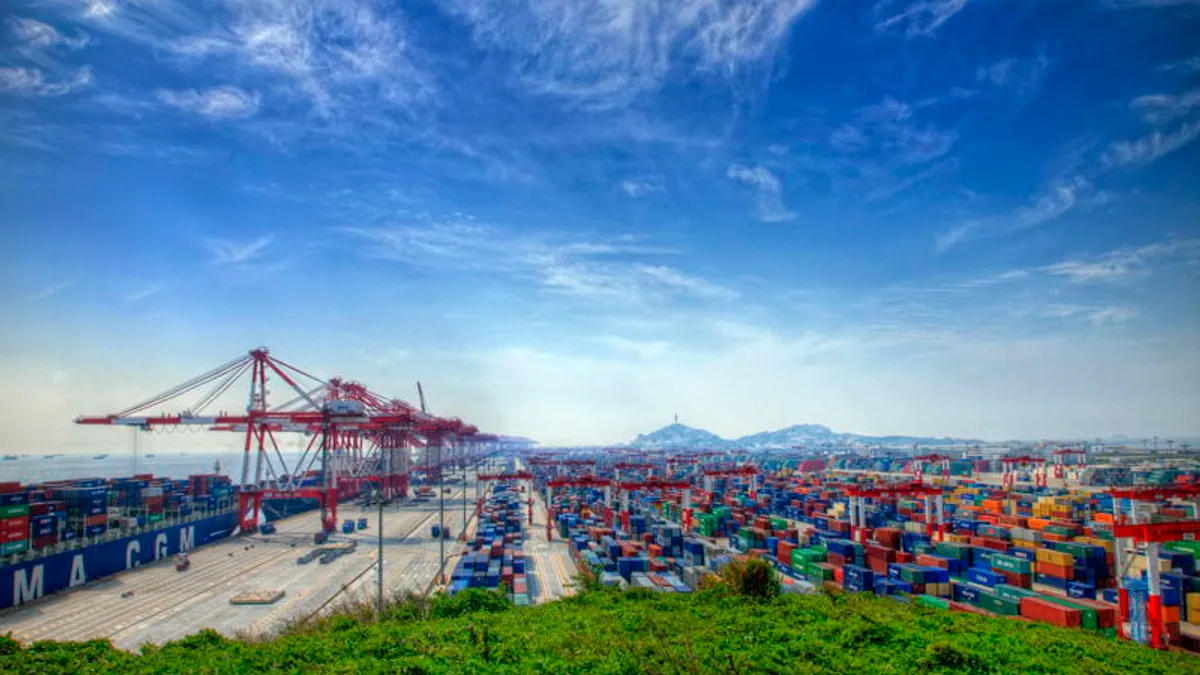Dive Brief:
- Ocean shipping analysts expect the equipment shortages that plagued shippers in 2020 to end at some point in 2021, though there are differing opinions on when the market will normalize and containers will become easier to acquire.
- Container xChange, a container leasing and tracking company, said container manufacturers are working at full capacity to churn out the finished inventory, and it expects Lunar New Year (Feb. 12) to be an important turning point for the industry. "With the vast increase we're seeing in the container availability, Shanghai is on its way back to normal levels," Container xChange wrote in a press release this week. "A similar development is happening across other ports in China."
- Lars Jensen, CEO of SeaIntelligence Consulting, also said while speaking at a Flexport webinar Tuesday that the issue of equipment shortages could be resolved by Lunar New Year as new equipment orders enter the market, noting that it could even lead to an oversupply of containers in 2021.
Dive Insight:
The demand for ocean shipping at the end of 2020 created a number of headaches for supply chain stakeholders, including increased rates, port congestion and difficulty obtaining equipment from chassis to containers. But 2021 could finally provide some relief.
Container xChange's index of container availability is already showing improvement from just a month ago.
"With a growth of 37.5% for [40-foot high cube containers] and even 200% for [40-foot dry cargo containers] in January compared to December 2020, the Container Availability Index finally shows a positive trend for shippers and forwarders who are looking for equipment in Shanghai," Container xChange Head of Data Insights David Amezquita said in a statement.
U.S. exporters have been especially vocal about their difficulties obtaining containers, as many carriers headed back to Asia with empty containers rather than sending them inland to be filled. Two Federal Maritime Commission Commissioners warned ocean carriers that denying containers to U.S. exporters could violate the Shipping Act.
While containers are entering the market, it could take some time to get the containers to the locations that need them and rebalance the networks, said Flexport's Ocean Freight Vice President Nerijus Poskus.
"It varies by carrier. It could be that one carrier has equipment, another carrier has completely no equipment," he said. He thinks the equipment shortages could endure past the Lunar New Year and "continue at least in the first half of 2021."
Jensen said his timeline for recovery is based on how the ocean market bounced back from a tight environment in 2010 following the global financial crisis. The economic recovery then resulted in a similar situation in which container demand far outpaced supply, he said.
"At that point in time, there was a massive ordering spree of containers," he said. "And then we ended up with overcapacity on the container side. We're gonna see a replay of it."
One difference, in this case, is the port congestion, which has tied up containers and slowed down the ability to balance networks, he said. Nearly a quarter of cargo at southern California ports experienced a dwell time of greater than five days between September and November, according to the latest numbers available from the Pacific Merchant Shipping Association.
"But once this gets alleviated, [equipment is] not going to remain gold for very long," Jensen said.
As the ocean shipping industry works to match supply to demand, ocean carriers had been planning to work overtime through the Lunar New Year, which is typically a slow season for the market. But long lines of ships at ports have forced carriers to implement blank sailings for holiday, Jensen said.
"Up until a few days ago, it was very clear that the carriers all had the intention of not blanking anything after Chinese New Year to clean up the mess," he said, noting that THE Alliance has announced more than 20 blank sailings around Lunar New Year. "Under normal circumstances, nobody should be worried about 20 odd blank sailings from an alliance after Chinese New Year. But this is not normal circumstances."














